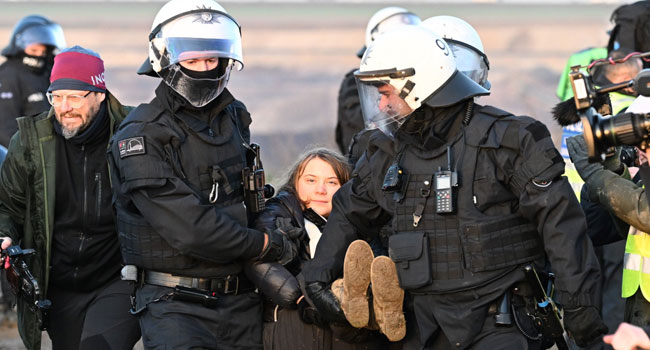Swedish climate activist Greta Thunberg was hauled away and detained on Tuesday during a protest near a German village being razed to make way for a coal mine expansion, police said.
Thunberg has been in Germany for several days to support protests against the demolition of Luetzerath, which have become a symbol of resistance against fossil fuels.
Images showed the activist, dressed in black, being picked up by police officers wearing helmets and then escorted to a waiting bus.
A police spokeswoman said a group of activists were in custody after having “broken away from the demonstration”, and run towards the edge of an open pit.
Officials were working to identify the protesters in custody, and a decision would be made later about what further action to take, she said.
The spokeswoman added the activists had not been formally arrested.
On Saturday, Thunberg joined thousands of demonstrators in a large-scale protest against the demolition of the hamlet, marching at the front of a procession.
She said it was “shameful” that the German government was “making deals and compromises with fossil fuel companies”.
On Monday, the last two climate activists occupying the hamlet to stop it being razed left their underground hideout, marking the end of the police operation to evict them.
Around 300 activists had occupied the village, staking out emptied buildings and constructing positions in the trees, to try to prevent the expansion of the adjacent Garzweiler open-cast coal mine.
‘Stop coal’
Luetzerath has been deserted for some time by its original inhabitants, as plans move forward for the expansion of the open-cast mine, one of the largest in Europe, operated by energy firm RWE.
Police launched an operation last week to clear the protest camp, making quicker progress than expected, and by Sunday had succeeded in removed all but the last two, holed up in a self-built tunnel under the settlement.
The end of the operation came despite Saturday’s demonstration, which was attended by thousands, with protesters holding banners with slogans including “Stop coal” and “Luetzerath lives!”
Protest planners accused authorities of “violence” after clashes between police and participants, which resulted in injuries on both sides.
RWE has permission for the expansion of the mine under a compromise agreement signed with the government, led by Social Democrat Chancellor Olaf Scholz.
Under the deal agreed in October, Luetzerath will be demolished, while five neighbouring villages are spared.
At the same time, RWE also agreed to stop producing electricity with coal in western Germany by 2030 — eight years earlier than previously planned.
With Russia’s gas supply cut in the wake of the invasion of Ukraine, Germany has fallen back on coal, firing up mothballed power plants.
The extension to the mine is deemed necessary to secure Germany’s future energy supply.
But activists argue extracting the coal will mean Germany misses targets under the key Paris climate agreements.




